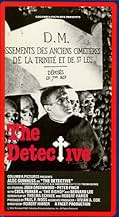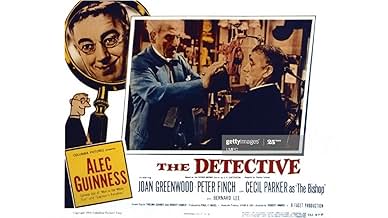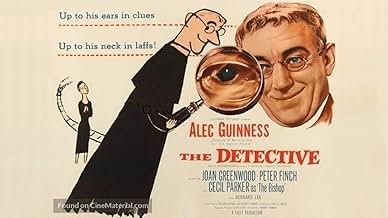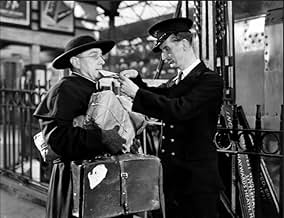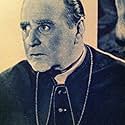Ajouter une intrigue dans votre langueWorks of art are disappearing, stolen by a master thief, a master of disguise. Father Brown has two goals: to catch the thief and to save his soul.Works of art are disappearing, stolen by a master thief, a master of disguise. Father Brown has two goals: to catch the thief and to save his soul.Works of art are disappearing, stolen by a master thief, a master of disguise. Father Brown has two goals: to catch the thief and to save his soul.
- Réalisation
- Scénario
- Casting principal
- Récompenses
- 1 victoire et 1 nomination au total
- Inspector Dubois
- (as Gerard Oury)
Avis à la une
The film itself, featuring a superbly witty script and deft direction, is a thoroughly delightful and occasionally hilarious gem - made by and with several exponents of the famed Ealing style, it's admirably served by a splendid cast. Alec Guinness is at somewhere near his best in the title role (unassuming, accident-prone but uncommonly shrewd and entirely amiable, his influence on future Peter Sellers characterizations - such as the priest in HEAVENS ABOVE! (1963) and Inspector Clouseau - is very evident); Joan Greenwood is somewhat underused here, but she's quite good as an aristocratic widow and Father Brown's confidante; a young Peter Finch impresses as the gentleman thief Flambeau, engaged in a battle-of-wits with Guinness throughout in which the two clearly respect and admire one another - but the rogue is averse to the priest's attempts to redeem him! Other familiar - and welcome - British faces grace the supporting line-up: Bernard Lee as a cop; Sid James as a ne'er-do-well small-time crook; Cecil Parker as Guinness' flustered superior, a bishop; and Ernest Thesiger as a dotty ancient librarian who appears in only one scene, but it turns out to be one of the film's comic highlights. Other memorable moments involve the various disguises Flambeau adopts in his attempts to outwit Guinness, such as in the lengthy catacombs and auction sequences.
Despite Hamer's reputation, this particular film seems to have been somewhat neglected - or, at least, has had its importance downplayed - over the years; in my opinion, along with KIND HEARTS AND CORONETS (1949; undeniably his masterpiece) and IT ALWAYS RAINS ON Sunday (1947; which I only first watched a couple of months back), it stands as the director's finest work. At the time, it was deemed worthy of representing Britain at that year's Venice Film Festival, where it competed against such cinematic heavyweights as Federico Fellini's LA STRADA, Elia Kazan's ON THE WATERFRONT, Akira Kurosawa's SEVEN SAMURAI, Kenji Mizoguchi's SANSHO THE BAILIFF and Luchino Visconti's SENSO - except that Renato Castellani's little-seen version of ROMEO AND JULIET (featuring Laurence Harvey) emerged the overall winner!!
FATHER BROWN was also Robert Hamer's second of four collaborations with star Alec Guinness: I own THE SCAPEGOAT (1959), an interesting film co-starring Bette Davis, on VHS and had watched it many years ago; however, I missed out on TO Paris, WITH LOVE (1954) - which, by all accounts, is a disappointing trifle and easily the least of their films together. A side-note regarding Guinness: according to the IMDb, he actually converted to Roman Catholicism soon after the release of FATHER BROWN!
What makes it more intriguing than the average crime/mystery movie is that from the start Father Brown is more interested in reforming the criminal than in punishing him. It leads to a story that has some of the same elements as a conventional crime film, but it also adds a creative dimension that makes it so much more interesting than the dreary, excessive spectacles of the present time that drown out any substance with undue amounts of violence and crudity.
The story could, of course, have easily become implausible and/or annoyingly moralistic, but thanks to Guinness's usual fine performance, and good direction from Robert Hamer, that is not at all the case. While there's nothing flashy here, it's an interesting and enjoyable little feature, and a nice change of pace.
He does this by undoing the crimes they have committed like stealing. He will return the stolen items.
He has a Cross that is likely to be stolen by a crook no one can identify. Father Brown is out to find that crook and bring him back to Christ.
Some of the story takes place in church to me it is very inspirational. He explains what most people do not know is that he hears the confessions of a lot of different kinds of people and he wants them to repent and come back to God.
It is heart warming to hear Scripture and also the stories of the bad people he meets and then tells them they don't have to be the way they are.
This is one movie where they are not mocking Priest, Catholics or those who believe in God. Funny and inspirational.
You can see it on Youtube. Father Brown The Detective 1954 (Alec Guiness) http://www.youtube.com/watch?v=4gqwXeHI85A
Le saviez-vous
- AnecdotesSir Alec Guinness was spotted in costume while walking home through the French countryside. A young boy ran up to him, yelling "Mon père! Mon père!" ("My father! My father!") Guinness did not speak French, so he could not correct his mistake, but was touched that the boy apparently immediately bonded to him on the assumption that he was a priest. Soon after this movie was released, Guinness converted to Catholicism.
- GaffesIn the stained-glass window behind the (catholic) bishop, there is a portrait of Henry VIII (second from left). Given that Henry was the first king to oppose the pope and separate the Church of England from the catholic church, his face would never be tolerated in this place.
- Citations
Father Brown: Perhaps you think a crime horrible because you cannot imagine yourselves committing it. That isn't true, you know. What really horrifies you is the secret and shameful knowledge that you are capable of committing it. We all are, I no less than you. We were not made good people or bad people. We were made people.
- ConnexionsRemake of Father Brown, Detective (1934)
Meilleurs choix
- How long is The Detective?Alimenté par Alexa
Détails
- Date de sortie
- Pays d’origine
- Langues
- Aussi connu sous le nom de
- The Detective
- Lieux de tournage
- Strand-on-the-Green, Chiswick, Londres, Angleterre, Royaume-Uni(The walk after Father Brown's release from the Police Station)
- Société de production
- Voir plus de crédits d'entreprise sur IMDbPro
- Durée
- 1h 31min(91 min)
- Couleur
- Rapport de forme
- 1.37 : 1

